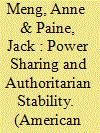| Srl | Item |
| 1 |
ID:
187658


|
|
|
|
|
| Summary/Abstract |
Regimes founded in rebellion are, typically, extremely durable. We propose that this stability is founded upon peaceful power sharing between the rebel regime leader and military elites. Amid long and intense fighting, rebel leaders must delegate control to top military commanders because doing so helps them to win battles. After seizing power, power-sharing deals between former combatants are highly credible due to their history of interactions, which mitigates the guardianship dilemma. Elsewhere, a persistent internal security dilemma often undermines power-sharing deals. Using originally collected data on African regimes from 1960 to 2017, we establish that rebel regimes break down seldomly compared with other authoritarian regimes and they experience fewer coups. Regarding the mechanism, rebel regimes more frequently share power with military elites by appointing a Minister of Defense. These Ministers are typically high-ranking members of the rebellion, which reflects the regime’s replacement of the state military with their own.
|
|
|
|
|
|
|
|
|
|
|
|
|
|
|
|
| 2 |
ID:
178668


|
|
|
|
|
| Summary/Abstract |
Under what conditions can dictatorships manage peaceful leadership transitions? This article argues that constitutional succession rules are critical for modern dictatorships, contrary to the predominant scholarly focus on hereditary succession or parties. An effective succession rule needs to solve dual problems of peaceful exit and peaceful entry. First, the rule must enable incumbents to exit power peacefully by reducing coup threats. Second, the rule must empower the designated successor to ensure that they can enter power peacefully. Constitutional rules help solve both problems, and are particularly effective when they appoint the vice president as the designated successor. The vice president’s access to material resources deters other factions from challenging the succession procedure, whereas designating successors without a power base is ineffective. Using original data on constitutional rules in African autocracies, I show that regimes that formally designate the vice president as the successor are more likely to undergo peaceful transitions.
|
|
|
|
|
|
|
|
|
|
|
|
|
|
|
|